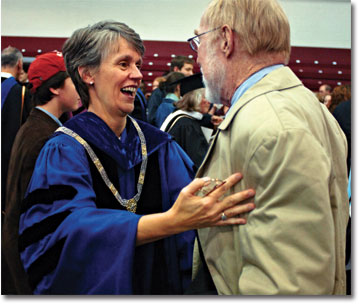President's Page: A Lasting Influence
Editor’s note: As this issue of the magazine was going to press, eager applicants to Vassar’s Class of 2013 were starting to hear from our Office of Admission — and The Wall Street Journal decided to turn the tables a bit on the presidents of ten of the nation’s top colleges. Just like the students applying to their schools, each president was asked to write a short personal essay; but instead of getting to choose from a list of topics, each president had to write about a topic chosen by the Journal — a topic gleaned from the list that the president’s own college offers to its applicants. President Hill’s topic was: “Indicate a person who has had a significant influence on you, and describe that influence.” Her essay was published in full in the online edition and was excerpted in the print edition of the May 9, 2009 Journal. The full essay is reprinted below. It may well remind you of your own experience with a favorite professor at Vassar.
When I was a young faculty member at Williams College, my teaching and research interests turned to the questions of poverty reduction and macroeconomic policies in the developing world. As is so often the case in academic settings, I was influenced by older and wiser minds, notably in this instance Professor Henry Bruton. The influence of Henry’s interest in how to improve the well-being of the world’s poorest people, particularly in Africa, eventually led me to a three-year residence in Zambia, where I applied my interests and talents directly to the problem. There, as one might expect, I was also influenced by people with more experience, and I learned as much about development economics as I contributed.
Again, because colleagues encouraged me to become involved in the running of the college, including admissions and financial aid, I began at the mid-point of my academic career to consider the implications for our society of the question of accessibility to higher education by students and families in the lower half of the income distribution in America. Here I was fortunate to collaborate with another mentor, Professor Gordon Winston, whose research focused on important economic issues affecting higher education in the United States, especially at highly selective colleges. I took the influence of that work on access and affordability with me to Vassar. Two years ago, after several years of strong financial returns on our endowment, we decided to return the college to a “need-blind” admissions policy that considers applicants without regard to their ability to pay. This decision, encouraging greater socioeconomic diversity of the student body, is philosophically sound but certainly economically challenging.
(When it comes to big decisions, I’ll note that Vassar’s timing has been worse. Matthew Vassar founded the college in February of 1861, about a month before the bombing of Fort Sumter and the start of the Civil War. What looked like a great idea in February seemed more daunting by April, but the college successfully opened in 1865.)
We, and other institutions of higher education, are at a perilous juncture. We need to adjust to the new economic realities while maintaining our commitment to access and affordability. Not to do so would risk the public’s trust and future support.
Development economics and higher education accessibility share one fundamental: they both ask us how we can take the resources of a world where wealth is limited and unevenly distributed, and adjust that to the benefit of everyone. The world would be safer and stronger if every nation enjoyed more prosperity and if every talented student, regardless of income, could attend college or university.

President Hill greets Professor Gordon Winston at her inauguration in 2006.
Gordon and Henry, fellow economists, friends, and colleagues, have influenced my career path from economist and professor, to provost at Williams, to president at Vassar. Retired now from teaching but still going into the office, both are quintessential college professors — active researchers, superb teachers, and committed to the ideals of a liberal arts education. Both have an amazing ability to ask the important questions and then make progress on discovering the answers. I think of them often as we work through extremely complex issues in these uncertain times.

Catharine Hill, President
Have comments about this article? Email vq@vassar.edu
